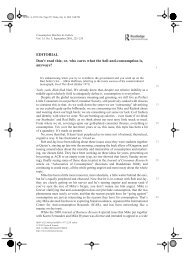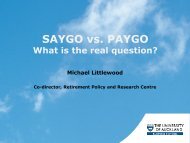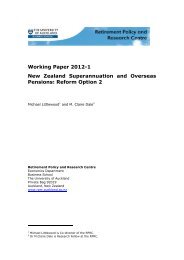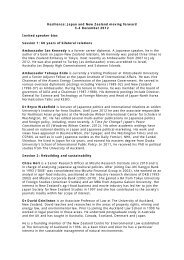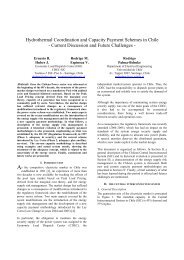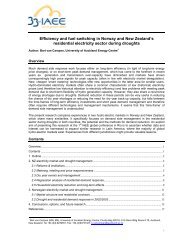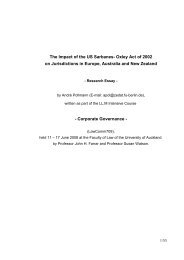TAX NONCOMPLIANCE AMONG SMALL and MEDIUM ...
TAX NONCOMPLIANCE AMONG SMALL and MEDIUM ...
TAX NONCOMPLIANCE AMONG SMALL and MEDIUM ...
Create successful ePaper yourself
Turn your PDF publications into a flip-book with our unique Google optimized e-Paper software.
Singapore is 17%. Given that SMEs are the engine of growth, Dr. Veerinderjeet Singh, a<br />
managing director of Tax<strong>and</strong> Malaysia Sdn Bhd recommended that corporate tax rate should be<br />
further lowered. Despite of having a two-tier structure, he suggested to have up to the three-tier<br />
structure, say the first RM500, 000 of chargeable income was taxed at 15%, the next RM500,<br />
000 taxed at 20% <strong>and</strong> the balance taxed at 25% (Dheshi, 2010)<br />
With regard to company size, this study found that small-sized companies are less compliant.<br />
Abdul Jabbar (2009) listed record keeping <strong>and</strong> documentation <strong>and</strong> tax complexity as two of the<br />
difficulties faced by SMEs. This study believes that these two difficulties might associate with<br />
tax noncompliance among SMEs. Moreover, with the implementation of SAS, the problem with<br />
record keeping <strong>and</strong> documentation required many taxpayers turn to tax practitioners’ services.<br />
Lai <strong>and</strong> Choong (2009) served evidence when the majority of their respondents (tax practitioners)<br />
concurred that SAS brings more business to them. In terms of tax complexity, a number of public<br />
rulings have been issued by the IRBM since the SAS. However, surprisingly, a study by Choong<br />
<strong>and</strong> Lai (2008) revealed that the majority (93%) of the respondents who are business taxpayers<br />
has no idea of the number of public rulings which have been issued, let alone read any of them.<br />
As such, the government should develop new strategies to underst<strong>and</strong> the causes that motivate<br />
SMEs’ noncompliance behavior.<br />
In 2008, United Kingdom’s HMRC has conducted an anthropological research on motivating<br />
SMEs’ compliance (OECD, 2010). Some of the interesting findings are (1) tax is seen as<br />
complicated; many SMEs have a poor tax habit which leading them to over-relies on an<br />
accountant; <strong>and</strong> (2) small businesses believe in the principle of fair exchange, tax compliance is<br />
seen as an activity for which SMEs get no return. Therefore, the IRBM themselves should<br />
consider conducting similar research which is based on ethnographical work to study SMEs in<br />
their native environment <strong>and</strong> to explore their daily work <strong>and</strong> attitudes toward tax compliance.<br />
The findings of the research perhaps can enable the IRBM in shaping its products <strong>and</strong> services,<br />
so that they can work with the SMEs rather than against it.<br />
Nevertheless, penalty rates, financial liquidity, foreign ownership <strong>and</strong> types of industry were<br />
found to have no significant effect on corporate tax noncompliance. The findings of this study<br />
although based on limited data <strong>and</strong> information, hopefully can provide some insights to the tax<br />
authorities. For example, Tax Audit Framework (IRBM, 2009) stated that cases for audit will be<br />
selected based on specific industries. In future, the tax authority should r<strong>and</strong>omly select from all<br />
types of industry rather than a specific industry. This is because this study found that there was<br />
no significant difference between types of industry <strong>and</strong> tax noncompliance. Since most taxpayers<br />
know the chances to be audited is once in every five years, therefore, this will motivate them to<br />
continue engage in noncompliance. OECD (2010) suggested tax authorities to administer audits<br />
consequently <strong>and</strong> over a long period of time in deterring hard core <strong>and</strong> experienced tax non<br />
compliers. By building perception that those hardened <strong>and</strong> experienced tax non compliers are<br />
20



